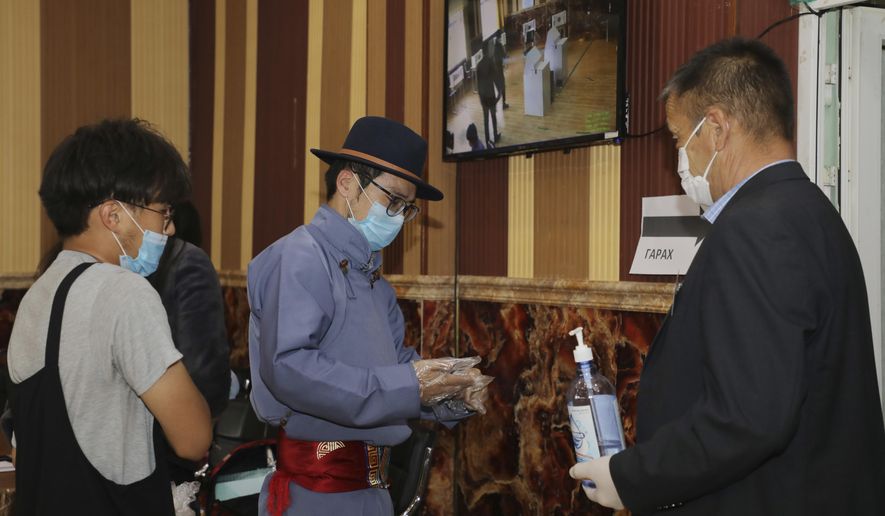ULAANBAATAR, Mongolia (AP) - The Mongolian People’s Party retained a strong parliamentary majority, preliminary election results showed Thursday, as the U.S.-allied nation sandwiched between Russia and China held onto its democratic principles amid economic woes.
The MPP secured 62 of 76 seats, while the main opposition Democratic Party won 11 seats and three others were taken by independents and coalitions, the General Election Commission said Thursday.
People followed strict social distancing measures during Wednesday’s vote in a vast, landlocked country that has had considerable success in fending off the coronavirus. Voters maintained 2 meters (6.5 feet) between them while standing in lines at polling stations in the capital, Ulaanbaatar. Once inside the polling place, election workers checked their temperature and distributed hand sanitizer.
Mongolia has recorded just 216 cases of COVID-19 as of Thursday, all of them imported, and no one has died.
The election result marks the first time a single party has retained an absolute majority in consecutive elections. Previously the Mongolian People’s Party and the Democratic Party had taken turns wielding a majority in the State Great Khural or were compelled to form coalition governments.
The landslide victory will allow Prime Minister Ukhnaagiin Khurelsukh to freely form a new cabinet or maintain his current cabinet without facing any opposition.
He will, however, need to work with President Khaltmaagiin Battulga of the Democratic Party, who was elected in 2017 and was not on the ballot.
Economic malaise, corruption and weak public services dominated concerns among the country’s 3.2 million people, about half of whom live in Ulaanbaatar.
Turnout was more than 73% among the country’s 2 million eligible voters, signifying the continuing strength of Mongolia’s democratic system instituted after a new constitution was adopted in 1992 following six decades of communism.
The MPP’s majority is down slightly from the 65 seats it won in 2016’s election. Some scattered rural communities had yet to report their results, but that was not expected to have a significant impact on the final outcome.
The MPP’s victory was seen as partly based on its general competence in running government affairs and deft handling of COVID-19.
Mongolia moved swiftly to close its borders in January to prevent the virus from spreading into its territory. Those diagnosed generally have been Mongolians returning from Russia and other nearby nations. The Ministry of Health says 158 have recovered and 57 remain in treatment and isolation.
Health Minister Sarantuya Davaajantsan was reelected with one of the highest vote counts in her district, in what appeared to be an endorsement of the government’s handling of the pandemic.
Pensioner Tungalag Jambal, 68, said he voted for his local MPP candidate based on the party’s success in handling coronavirus and reducing Ulaanbaatar’s notoriously awful winter air pollution.
“I really hope they will keep doing what they are doing and support ordinary people like us,” Jambal told The Associated Press.
Others were less happy with the party’s overwhelming victory.
Ariunzaya Artbazar, a middle-aged volunteer with a Buddhist religious organization, said poverty had prompted many Mongolians to “vote with their stomachs.”
“The result clearly shows the need for an overhaul of the education system and traditional thinking,” said Artbazar, who backed independent candidates.
Enkhtur Tsiiregzen, 45, an internet entrepreneur, likened the election to a television talent contest. “The result is important for the winners, but not beneficial to the public. It has always been like this,” he said.
The MPP appeared to have benefited from a split vote among the opposition in a race that saw 606 candidates seeking office. Each of the country’s districts elected two to three lawmakers and as many as 28 candidates ran in one district of Ulaanbaatar alone.
Mongolia’s main asset is its vast mineral wealth, but it has struggled to attract foreign investment because of plunging commodity prices and disputes with large investors such as mining giant Rio Tinto.
Corruption and a national debt that has bulged to about $23 billion, or twice the country’s annual economic output, have also been a major drag on the economy. More than 30% of Mongolia’s people live below the poverty line, and despite its success in holding down infections, the economy is set to shrink because of the pandemic while consumer prices are rising.
Among six candidates who ran their campaign from prison, former Prime Minister Erdenebat Jargaltulga won in his home province of Selenge in northern Mongolia with a large majority.
Jargaltulga was jailed in 2017 after being accused of misuse of power and cronyism. It’s unclear whether the investigation into his alleged misdeeds will continue following his election.
Mongolia has strived to maintain its political and economic independence from both Soviet-era patron Moscow - which supplies virtually all of its energy needs - and rising regional power China, which buys more than 90% of its mining exports, mainly coal and copper.
Washington has sought to encourage good governance and the growth of civil society in Mongolia, along with holding joint military drills and making Mongolia a NATO partner nation. Many Mongolia’s refer to the U.S. as their country’s “third neighbor” in recognition of the many varied exchanges between the two that help counter both Russian and Chinese influence.
The MPP victory “brings some stability” during a turbulent era, but the fact that 27 of the party’s winning lawmakers are new to office also represents a generational change for the party, said Julian Dierkes, an expert on Mongolian politics at Canada’s University of British Columbia.
“Perhaps the opposition, especially some of the new political forces, lost this particular battle but might be fighting a bigger war to change the political culture of Mongolia, away from the personalized patronage politics that are a breeding ground for corruption, toward more substantive policy debates that will give Mongolians a greater say in the future of their country,” Dierkes said.




Please read our comment policy before commenting.